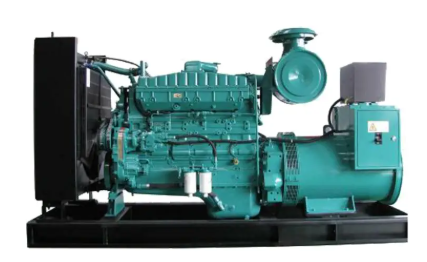Key Features and Benefits of Diesel Generator Sets
High Power Output and Reliability
Diesel generators pack serious power and keep going when other systems fail, which is why big operations rely on them so much. These machines come in all sizes really from small units putting out just a few kilowatts up to massive models generating multiple megawatts of electricity. Most manufacturers put these generators through intense testing before shipping them out because nobody wants equipment that breaks down during emergencies. Take a look at real world usage and many diesel generators run reliably for thousands of hours each year straight through without missing a beat. When blackouts hit cities or factories lose grid connection, it's often these diesel powered backups that keep things running smoothly. Hospitals need this kind of backup power to maintain life support systems while manufacturers depend on it to protect expensive production lines from unexpected shutdowns.
Fuel Efficiency and Operational Longevity
Compared to their gasoline counterparts, diesel engines generally run hotter and convert more of that heat into usable power, which means they get better mileage and save money at the pump over time. Many newer diesel generators feature sophisticated fuel injection technology that adjusts precisely to whatever workload comes along, whether it's powering a small workshop or running heavy machinery all day long. According to various industry studies, if properly maintained, these machines can keep going strong past the 20,000 hour mark before needing major repairs. The fact that they last so long makes sense for businesses looking to protect their initial investment while avoiding those frustrating power outages that disrupt operations. Sure, diesel prices do go up and down with market forces, but when considering both fuel economy and overall lifespan, most operators still find diesel generators represent good value despite occasional price spikes.
Versatility in Standby and Peak Shaving Applications
Diesel generators show real flexibility, switching between backup power when there's an outage and helping manage high demand periods without much trouble. Because of this flexibility, these power units can work well in all sorts of places - think hospitals needing reliable electricity, massive data centers running around the clock, or factories with unpredictable power needs. Companies across different industries have actually saved money on their energy bills while getting better power stability by using diesel generators during times when electricity prices spike. Take a look at market trends: peak shaving remains one of the fastest growing areas for diesel generators right now, sitting just behind emergency backup systems. This makes sense since these generators help keep grids stable and cut down on those expensive utility charges. That kind of practical value keeps diesel generators relevant in so many important sectors where consistent power supply matters most.
Comparison with Alternative Power Solutions
Solar Power Systems: Sustainability vs. Intermittency
Solar power remains one of the most sustainable options around these days, mainly because it doesn't cost much to run once installed. But there's a catch - since the sun doesn't shine all day every day, many places still need backup power sources like diesel generators to keep things running smoothly during cloudy periods or at night. Some research shows that mixing solar panels with diesel generators works pretty well for continuous power delivery while keeping some green credentials intact. What people often forget about solar panels though is how much room they take up and how dependent they are on good weather conditions. Diesel generators don't have this problem. They fit in smaller spaces and work reliably regardless of whether it's raining or snowing outside. That's why diesel remains so important as a backup option for solar installations, even though nobody wants to hear about it.
Battery Storage: Cost vs. Limited Capacity
Battery storage systems are catching on fast for storing renewable energy, but many still struggle with capacity issues and reliability problems, particularly when it comes to meeting power needs over extended periods. Even though battery tech keeps getting better, the upfront cost for good quality systems remains pretty high, and batteries just don't last as long under heavy loads compared to old fashioned diesel generators. Looking at real world numbers shows diesel generators still make financial sense for some operations when we factor in total lifecycle costs versus what batteries would cost over time. For businesses needing consistent power without interruption, this matters a lot. Industries like manufacturing plants or remote mining operations find diesel generators offer dependable backup solutions when the grid fails or renewable sources fall short during peak demand times.
Natural Gas Generators: Emissions vs. Fuel Availability
People generally give credit to natural gas generators for producing fewer harmful emissions compared to diesel models. But here's the catch they need reliable access to natural gas at all times to function properly. When things go wrong because of conflicts between countries or when hurricanes hit, those gas lines get cut off, making diesel generators look much better during emergencies. Real world data shows diesel units tend to keep running when the power goes out, something natural gas generators struggle with since their fuel comes from complex distribution networks. So even though diesel doesn't have the green credentials of natural gas, most folks still reach for them when storms roll in or pipelines freeze over because they know where their fuel is coming from and how long it will last under pressure.
Application-Based Performance Analysis
Commercial Sector Needs: Data Centers and Healthcare
Most data centers and hospital campuses rely heavily on diesel generators as their main source of emergency power. These generators act as insurance against blackouts that could wipe out years of stored information in server rooms or shut down surgical equipment mid-procedure. The need for constant electricity simply can't be overstated in places where even a few minutes without power means disaster. According to recent studies by various energy watchdog organizations, facilities that incorporate diesel generation into their infrastructure see measurable improvements in system stability and downtime reduction. For many operators, this translates directly into saved lives and protected business assets during grid failures.
Industrial Demands: Manufacturing and Oil & Gas
Power requirements in manufacturing tend to go up and down quite a bit, which means companies need good backup options like diesel generators if they want to avoid production stoppages. These generators really help out when there are sudden shifts in demand, keeping things running smoothly without major interruptions. For oil and gas operations far from main power grids, portable diesel units become essential equipment because they work reliably even under tough conditions. Looking ahead, many industry reports point toward continued dependence on fossil fuel powered generators across both sectors. They simply provide dependable electricity supply while helping keep those unpredictable energy costs from spiraling out of control too much.
Residential Use: Backup Power vs. Noise Concerns
Most people rely on diesel generators mainly because they kick in when there's no electricity, keeping homes safe and secure during power cuts. The downside? Noise remains a big issue for many residents living near these units. That's why companies have started putting money into better insulation techniques that cut down on the racket while still delivering solid power. According to recent surveys, most homeowners care more about getting reliable energy than worrying about how loud their generator is. This means there's real demand in the market for diesel systems that work well but don't make neighbors complain about constant noise pollution.
Cost and Maintenance Considerations
Initial Investment: Diesel vs. Renewable Systems
Looking at power options, most people still go for diesel generators instead of complicated renewable systems because they cost less upfront. Diesel generators are cheaper to get started with, so they appeal to folks who need something working fast during emergencies. This makes all the difference when time matters most. According to industry reports, diesel generators deliver quicker results and better ROI than big renewable installations. Those green energy projects usually demand lots of money right from the start and take ages to pay off. For businesses facing tight deadlines or budget constraints, diesel remains the go to choice despite what environmentalists might argue.
Operational Costs: Fuel Prices and Efficiency Trends
The cost of fuel remains one of the biggest factors when running diesel generators, making efficiency improvements really important for operators. Recent advancements in diesel engine tech have cut down on how much fuel these machines burn, helping keep running costs more stable month to month. For businesses looking at long term plans around generator use, this matters a lot since even small fluctuations in fuel prices can throw off budget projections completely. Most experts agree that we're likely to see continued volatility in fuel markets going forward, so companies should regularly check their equipment's efficiency levels and look into newer models that promise better fuel economy as part of their maintenance routines.
Long-Term Maintenance: Downtime and Component Lifespan
Keeping diesel generators well maintained helps cut down on unexpected downtime and keeps them running reliably day after day. When companies spend money on quality parts for their generators, they actually get better performance over time, which means fewer breakdowns and lower repair bills in the long run. Good maintenance practices do more than just keep things working right they save money overall when looking at what generators cost throughout their entire lifespan. We've seen plenty of data showing that proper care makes all the difference financially compared to generators that sit neglected until something breaks. For businesses relying on continuous power supply, sticking with regular maintenance routines turns out to be worth every penny spent on preventive measures instead of emergency fixes later on.
FAQ
What is the typical lifespan of a diesel generator?
A well-maintained diesel generator can have a lifespan exceeding 20,000 hours, highlighting its operational longevity and reliability.
How do diesel generators support solar power systems?
Diesel generators provide supplemental power to solar systems to ensure a continuous supply, particularly when solar energy generation is intermittent.
Are diesel generators cost-effective compared to other power solutions?
Yes, diesel generators are generally cost-effective due to their lower initial investment and operational efficiency, particularly in emergency situations.

